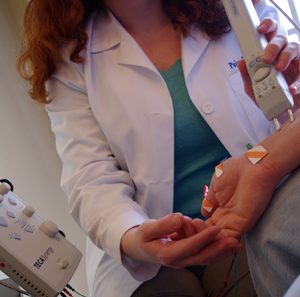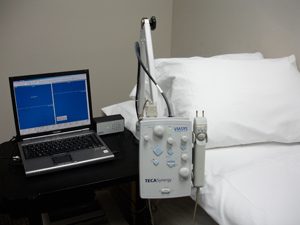What is an EMG/NCS Test?
The term EMG is frequently used to describe the entirety of a diagnostic test that is actually made of two parts: the EMG (Electromyogram) and the NCS (Nerve Conduction Study). Together these tests are also often called “electrodiagnostic studies.” They are tests of the function of nerves and muscles and help determine the health of the peripheral nervous system.
Why is the test performed?
In general, EMG/NCS can help diagnose the cause of symptoms such as numbness, tingling, pain, and weakness in the limbs.
- Localize the source of a problem. For example: it can differentiate between carpal tunnel syndrome, polyneuropathy, and radiculopathy as a source for hand discomfort
- Determine if the condition is the result of a nerve vs. muscle disorder
- Evaluate for concomitant disorders
- Exclude certain diagnoses
- Quantify severity
- Determine prognosis
- Help guide future testing
How is the test performed?
The electrodiagnostic consultation begins with a focused history and physical examination followed by the NCS and EMG portions of the test.
The NCS portion of the test involves the application of small electrical impulses to the skin’s surface to evaluate individual nerve function. The impulses are quick and may cause a mild muscle twitch or transient tingling feeling in the nerves tested.
The EMG portion of the test involves a tiny sterile needle electrode inserted into a muscle to evaluate the muscle and nerve integrity. The muscles are tested one at a time and nothing is injected into the muscles.
At Alabama EMG, Dr. Roy will walk you through the test in a step-wise fashion on the day of your consultation and will be available for any questions you may have regarding the test. Your comfort is important to Dr. Roy and her staff at Alabama EMG!
 Who will be performing the EMG/NCS test?
Who will be performing the EMG/NCS test?
At Alabama EMG the physician, Dr. Paige Roy, performs all portions of the electrodiagnostic consultation. This includes the history, physical exam, NCS, and EMG. Dr. Roy does not employ technologists to perform any part of the study.
How long will the test take?
The EMG/NCS test is tailored to each patient, depending upon the complexity of the problem being explored. On average, the consultation takes about 60 minutes but can take longer depending upon the intricacies involved.
How should I prepare for the test?
Your skin should be clean for testing, so please shower or bathe on the day of the test. Do not apply cream, lotion, or oil to your skin. Please avoid wearing excessive jewelry or extremely tight clothing on the day of the test. You do not need to fast prior to your appointment. You can do all of your usual activities before and after the test.
Please bring a list of your medications with you on the day of your visit. Please tell Dr. Roy if you are taking any blood thinning medications (such as aspirin) or if you have any bleeding disorder on the day of the test. *Please note, if you are taking Coumadin (Warfarin) we do require your INR level to be under a certain value in order to proceed with EMG testing. If you have any questions regarding this, please call Alabama EMG at 256-270-9979 prior to your appointment for further information.
On the day of your test, please tell Dr. Roy if you have a pacemaker, TENS unit, or any other bodily electrical device. As a courtesy, we will also ask you to please turn off your cell phone while in the office as it may interfere with testing.
How soon will I find out the results of the test?
At Alabama EMG, Dr. Roy typically can provide the patient with a general summary of the test results in the office immediately following the consultation. Dr. Roy will send the final electrodiagnostic test results to your referring physician so that further decisions can be made regarding your treatment plan.

